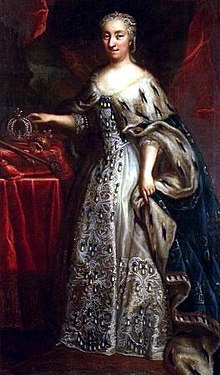Ulrike Eleonora of Sweden
| Ulrika Eleonora | |
|---|---|

Queen Ulrika Eleonora
|
|
| Queen of Sweden | |
| Reign | 5 December 1718 – 29 February 1720 |
| Coronation | 17 March 1719 |
| Predecessor | Charles XII |
| Successor | Frederick I |
| Queen consort of Sweden | |
| Tenure | 29 February 1720 – 24 November 1741 |
| Born | 23 January 1688 , Sweden |
| Died | 24 November 1741 (aged 53) , Sweden |
| Burial | Riddarholmen Church, |
| Spouse | Frederick I of Sweden |
| House | Palatinate-Zweibrücken |
| Father | Charles XI of Sweden |
| Mother | Ulrika Eleonora of Denmark |
| Religion | Lutheran |
Ulrika Eleonora or Ulrica Eleanor (23 January 1688 – 24 November 1741), also known as Ulrika Eleonora the Younger, was Queen regnant of Sweden from 5 December 1718 to 29 February 1720, and then Queen consort until her death.
She was the youngest child of King Charles XI and Ulrika Eleonora of Denmark and named after her mother. After the death of her brother King Charles XII in 1718, she claimed the throne. Her deceased older sister, Hedvig Sophia, had left a son, Charles Frederick of Holstein-Gottorp, who had the better claim by primogeniture. Ulrika Eleonora asserted that she was the closest surviving relative of the late king (the idea of proximity of blood) and cited the precedent of Queen Christina. She was recognized as successor by the Riksdag after she had agreed to renounce the powers of absolute monarchy established by her father. She abdicated in 1720 in favor of her husband, Landgrave Frederick I of Hesse-Kassel.
After their mother's death in 1693, Ulrika Eleonora and her siblings were placed in the care of their grandmother, Hedwig Eleonora. However, her grandmother was known to favor her elder sister. During her childhood, Eleonora was somewhat overlooked in favor of this elder, more extroverted and talented sister, princess Hedvig Sophia. Her elder siblings enjoyed riding and dancing and reportedly somewhat looked down upon her as she did not have the courage to participate in their games and was easily brought to tears. She was described as friendly, modest and dignified, with good posture and beautiful hands, but she was not regarded as either intelligent or attractive. Her grandmother, Hedwig Eleonora, described her as stubborn, and she was known to demonstrate her dislike of others or of events by simulating illness. She was a talented musician, and when performing with her sister at court concerts, she would play the clavier while her sister sang. Ulrika Eleonora lived most of her life in the shadow of others, outshone by her brother the king, and by her attractive sister.
...
Wikipedia
